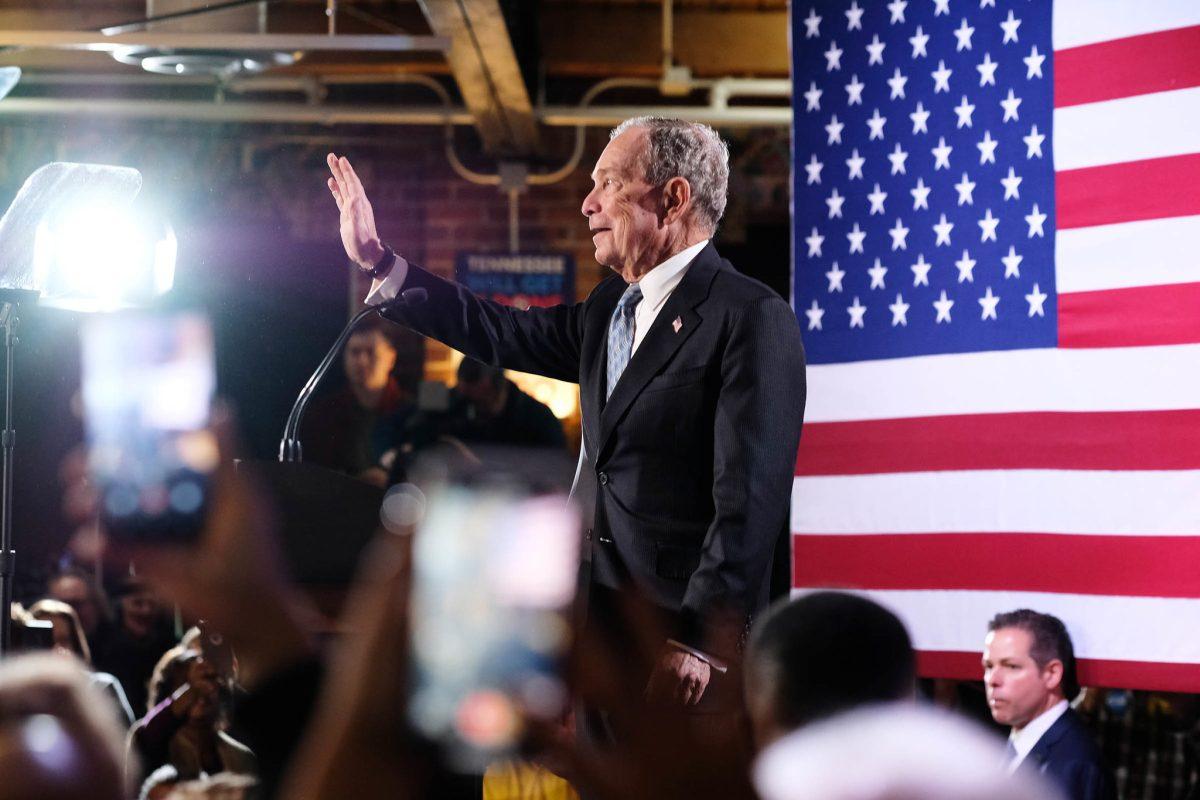Trigger warning: transphobia
Former mayor of New York Michael Bloomberg, the most recent addition to the pool of Democratic candidates for president, is skyrocketing in the polls. CNN’s Poll of Polls placed him third, with just one percent separating him from former Vice President Joe Biden. Just one day prior, BuzzFeed News published a scathing report that uncovered Bloomberg’s troubling transphobic past — and present. At a 2016 event at the University of Oxford, Bloomberg said the “best salesman” would be able to sell a Midwestern town — his idea of a population separate from “intelligentsia” such as himself — on the idea of a “man wearing a dress” being allowed in a girl’s locker room. A recorded conversation from March 2019 displayed similarly disturbing language. The candidate reportedly said that “If your conversation during a presidential election is about some guy wearing a dress and whether he, she or it can go to the locker room with their daughter, that’s not a winning formula for most people.” He went on to declare that “We’re focusing on a lot of things that have little relevance to people who are trying to live in a world that is changing,” plainly categorizing transgender rights as an issue “of little relevance” to the majority of Americans.
Bloomberg sees open and dedicated support for the transgender community as a threat to the mass appeal of a candidate, particularly in relation to votes in Middle America — a fallacy that is not only an insult to the attention and respect that the transgender community deserves, but also a gross undermining of the social consciousness of a large percentage of the American population. His flagrant insensitivity for the transgender community is in stark contrast to the inclusive message his campaign touts; fashion designer Isaac Mizrahi, for example, praised him for “fighting for the LGBTQ+ community” in a campaign video. A Bloomberg campaign spokesperson went on to claim that “Mike is running to defeat Donald Trump and reverse the many policies he has implemented that attack the rights of the transgender community.”
Bloomberg is not the first example of a presidential candidate who has used the transgender and greater LGBTQ+ community at large to appeal to more liberal voters while simultaneously revealing a cavalier disregard for their rights and an unwillingness to put their issues on the agenda. President Donald Trump, despite his incriminating history of scaling back LGBTQ+ rights — from slashed Title IX protections for transgender students to a conspicuous absence of LGBTQ+ mentions from government websites mere minutes after he was sworn in — actually entered the race as a self-labeled “real friend” of the community. In May 2019, Trump tweeted, “Let us stand… with the many LGBT people who live in dozens of countries worldwide that punish… individuals on the basis of their sexual orientation.” This tweet came just over a month after the administration’s controversial trangender military ban went into effect, which bars transgender individuals from transitioning once enlisted and does not allow recruits diagnosed with gender dysphoria.
Even Hillary Clinton, who helped forge guidelines for passport gender identification for transgender individuals as secretary of state and staunchly opposed North Carolina’s discriminatory HB2 Bathroom Bill, seemed to somewhat turn her back on the community as recently as last year. While promoting her book on inspiring female influences, Clinton was asked about Virginia Delegate Danica Roem, the first transgender individual elected to a U.S. state legislature. “Well, I do think there is a legitimate concern about women’s lived experience and the importance of recognizing that,” she responded, seemingly implying that an advancement in transgender womens rights would threaten the cisgender “women’s lived experience.” She went on to say that “This is all relatively new. People are still trying to find the language for it, trying to sort it out. I think in the right mindset this can be understood, but it’s going to take some time.” Clinton’s exclusionary view of transgender women and her unfamiliarity with the painful history of their battles is a sharp divergence from the rhetoric on which she ran her presidential campaign, when she pledged to “work to protect transgender individuals from violence.”
This behavior has become an unacceptable pattern. Candidates pay lip service to the LGBTQ+ community and, more specifically, to transgender individuals before promptly neglecting their issues once their political goals are realized. Bloomberg is just the latest example in a sea of politicians who take advantage of an underrepresented community with hollow promises and plans while privately — and at times, even publicly — contradicting their own platforms with blatant ignorance. It is our responsibility as voting citizens in this country to dig deeper into the stances presidential candidates adopt, to ensure we elect an individual who intends to put action behind their words rather than pander to the interests of a constituency they intend to abandon.




